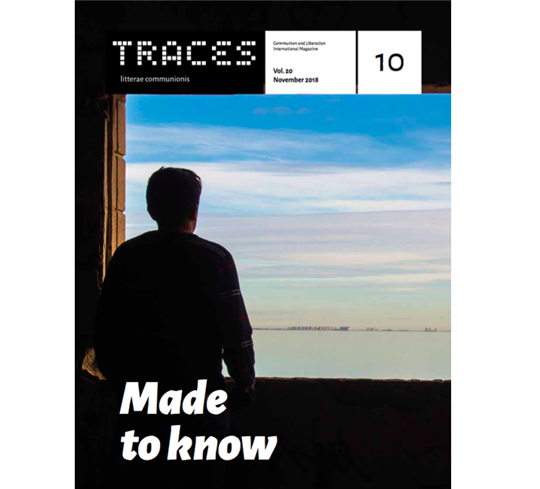
Traces N.10, November 2018
The Human FactorIn this issue of Traces we are trying to take another step on a journey. In the last month, we asked what makes it possible to generate people able to bear today’s confusion caused by the impact with a frighteningly chaotic reality that at times prompts the desire to simply withdraw into our shells. We said that in order to respond to the great emergency in education, places capable of generation are needed, not refuges for hiding from the waves, and we gave a few examples.
Now we move on further, with other questions. What instruments for not getting lost are available for an “I” who throws herself into the game, who goes out upon the open sea of reality to face without qualms the tangle of problems of which life is made–from the great political stage, harbinger of impending storms, to daily relationships with children and colleagues? How can this “I” be certain of something, and know?
Today’s chaos provides us with one ironclad certainty: in order to know, data, analyses, and theories do not suffice. The history of recent decades shows this clearly, and our current times confirm it beyond a shadow of a doubt. Today we have oceans of information, literally, and the capacity to analyze it, and both are growing at a dizzying pace. We have increasingly invasive ways to collect data and to create algorithms that process it in real time, that tell us with certainty which flight to take, which diagnosis our physician should make, and how many months of prison a judge should give a convicted criminal (in certain countries this is the norm). We have enormously powerful information and instruments to manipulate it, which are seen as objective because they are increasingly able to eliminate the impact of the “human factor.”
And yet, we are more confused than ever. This “metamorphosis of the world,” to use the words of sociologist Ulrich Beck, has left us stunned and disoriented, with the question of what it means today to “know.” What does it mean to know as human beings, with a modality that is appropriate to our needs, including our need for certainties and relationships? What contribution can Christianity make? Fr. Giussani said that “John and Andrew, the first two who ran up against Jesus, precisely in following that exceptional person, learned to know differently.” What is this difference?
In this issue we try to offer some kind of answer, proposing some reflections and two testimonies about the possibility of truly knowing in the important work of technological research, and in the story of a girl who encounters Christianity for the first time. The issue closes with the story of a production of The Divine Comedy in a Nairobi slum, which shows the emergence of the human factor in knowledge in all its power, and helps us to understand and know.